
1900! While the Lovelock Tribune quickly pointed out that this was not the start of a new century, it was a start of a new beginning for the Purviances. The family went from lessees to owners of The Singer Hotel and the family was all together. Bessie joined the family again in June of 1899 and decided to delay her education to help with the business at home and to enjoy her new hometown. If the family moved to Lovelock to be closer to Bessie in Reno, Bessie decided to be even closer by staying at home in Lovelock.  Bessie’s attachment to Lovelock could have been sparked by a young man who had noticed the striking blond beauty, and who was present at events that Bessie attended. In the future, Bessie’s growing relationship with Lovelock resident Sidney Hill would play a major role in Louise's life. Madison and Louise had more pressing concerns in early January 1900 and they involved the signing of a contract with another young man who was one of the most respected men in Lovelock. And it would be Madison Purviance who would pay the biggest price in the coming two years for the choices he was making… |
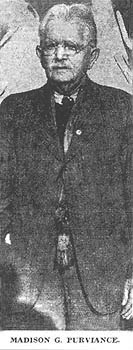 |
Madison Gates Purviance The first telling of the story of Edna Purviance’s father Research by Linda Wada © - November 2003-2016 Part Four - The Contract Who the Purviances Trusted Most Purviance Family Lovelock - 1900
Even the alfalfa in the neighboring fields was fooled into thinking it was spring as it poked its green shoots out of the ground, but the crisp desert nights would quickly freeze its green head back to the ground. |
| The unseasonably warm daytime weather would make one think the danger of catching a serious illness would be far less, but this was not the case. In warm or cold weather months, keeping ones health was always important, especially in those small western towns. Doctors were not plentiful in towns like Lovelock, though in the coming years, Lovelock would have a period where several doctors opened practices in town. But most of the time, very serious illness meant a train trip to San Francisco where the best health care was available. |
|
When people were not too seriously ill, they took care of themselves with home remedies or had a loved one or close friend care for them if they needed bedside care. But sometimes, the caretaker would catch the same illness from the person they were caring for. That is what happened to the Long family. Well-known county resident H.T. Long caught pneumonia at his family home in Lovelock. While caring for her husband, Mrs. Long also caught the same illness and both fell seriously ill. The Tribune newspaper published that Mr. Long was improving. But the illness had turned worst for the couple. By the time their family and friends began noticing something was wrong, (there were no telephones in Lovelock at this time) the Longs were found unconscious in their home with only their pre-school aged children watching them. Mrs. Long finally recovered, but Mr. Long was too weak, and he died soon afterwards. The funeral for Mr. H.T. Long was held on a rather balmy day on January 12, 1900. Lester Piper, Louise’s brother-in-law, was one of the pallbearers. Lester was married to Bessie Davey (Louise’s sister), and had three children at this time Flora, Effie and Viola Piper. The cousins made for excellent singing buddies for Edna. Bessie Davey Piper was the one who stayed with Louise during those early Hailey, Idaho, days when Louise first married Madison. The two sisters Bessie and Louise were very close and lived only one building away from each other in Lovelock for several years. Aunt Bessie helped care for her young niece and namesake Bessie when she was born in January 1882. Lester Piper was Charles Brown’s partner at the C.B. Brown store in Winnemucca in the mid-1890’s. They were cousins through the marriage of Julia Davey to Charles Brown. In 1899, Lester sold out his interest in the C.B. Brown store and moved his family to Lovelock. Lester brought lot 16 in city block 14, just south of the Singer Hotel Property (Singer Hotel was on lot 18). Lester built the Piper Hardware Store, which was modeled after C.B. Brown’s Hardware store in Winnemucca. Even Madison appeared to helped his brother-in-law build the store. Piper ran the store in Lovelock for several years. |
| But Piper would experience his first family funeral after being in Lovelock only three months. He was related to the Longs through the Brown family. The Lovelock Tribune reported Miss Purviance (most likely Bessie Purviance) singing in the choir at the Long funeral. It is highly likely Louise sang too, for she was a member of the church choir but the paper only mentioned a few of the choir members. Louise would sing at many funerals during her years in Lovelock. Death would haunt the Purviance family and family friends, young and old. And sudden illness would be the common killer. As the funeral proceeded, the Big Meadow school children in the church would have seen their teacher singing in the choir. Professor Lynip was the schoolmaster at Big Meadow School in Lovelock. (He is the gentleman I mentioned earlier to remember.) He was the young chap who visited Paradise Valley back in 1898 and was 'singing the praises' of his chosen hometown of Lovelock. Benjamin F. Lynip was well respected in the county for his judgment and fairness. Many people in the county called upon Lynip for his sound advice. And the Purviance family were just one of many to call upon Mr. Lynip’s’ counsel. Chances are the Purviances and Lynip talked on the day of the funeral, for something major had passed between them only a day earlier. |
 Researching records in Nevada. November 2002 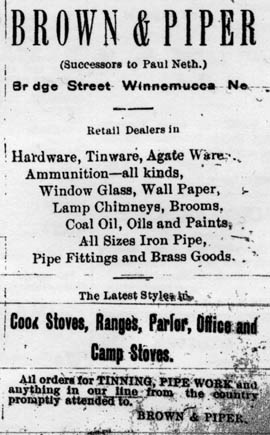
|
Words on Paper The Purviance’s Hotel In mid-December of 1899, Madison announced to the Lovelove Tribune the purchase of the Singer Hotel from Mrs. Catherine Bastian for the sum of $1650. Everything seemed to be going very well, but sometimes words in newspapers only highlight the public records, while words tucked away in courthouse archives reveal the legal ones.
There was no doubt Madison Purviance wanted to buy the Singer Hotel. When he first leased the hotel in December of 1898, he did so with an option to buy. So in December of 1899, when his lease came due, he exercised his option to buy. But it was not the purchase, but the source of the money to buy that is interesting. My best guess is that Madison had been trying to get a loan to buy the Singer Hotel property, as early as the summer of 1899. In August, the same week that Mrs. Bastian brought the hotel from George Singer, Madison was reported in the Tribune hosting a gentlemen from a San Francisco loan company at the Singer Hotel. He gave the gentleman a personal tour of the whole town and surrounding farms of Lovelock. The San Francisco gentleman was impressed, but not impressed enough to give Madison the loan it appears. Bastian purchased the hotel instead. Had the Hailey lawsuit of the unpaid funds to Cy Jacobs come back to haunt Madison? That may never be known, but in 1900 the State of Idaho did have these court records for anyone to read. In December 1899, things changed for Madison. He had two brother-in-laws owning businesses, C.B. Brown and Lester Piper, so he may have thought being the oldest of the group, it was time for him to own his business too! Lester Piper owning the store just two doors down from The Singer certainly could have played a role in Madison wanting to own the hotel. |
When Madison’s lease came due in December 1899, he decided to exercise his option to buy. It was announced in the Lovelock Tribune in mid-December that Madison Purviance brought The Singer Hotel from Catherine Bastian. But did he really buy the Singer in mid-December? Not according to the court records. There may have been delays in the loan or other difficulties. The court records only show that the official sale of The Singer Hotel was recorded January 11, 1900, not December 16, 1899 as was reported in the Lovelock Tribune. The Purviances did not have cash on hand to buy a hotel, so where did the money come from to purchase the hotel? The Purviances were always quick to know all the important people in town. In Boise, Madison worked for the mayor of the city Cy Jacobs. During Louise’s Silver City days, she knew all the important people in the social circles of Silver City, Idaho. Both were well known in Hailey, Idaho, in the early months. And of course during their long stay in Paradise Valley, Nevada, the family gained many longtime friendships, some who served state office in Nevada. Madison and Louise also seemed to gain the trust of the people that they knew, young and old. So in the end, the Purviances sought a loan from someone they knew and trusted in Lovelock. |
Benjamin F. Lynip Most Respected Man in Lovelock Lovelock did not have mayors during Madison's days, but the most liked and respected person in Lovelock could have been mayor without a contest. His name was Benjamin F. Lynip. Benjamin Lynip was a Stanford University graduate from San Francisco, California. He majored in academics because his dream was to be a teacher at Stanford. Unfortunately, Benjamin suffered a troubling eye disorder, which would require treatments for most of his life by San Francisco specialists. Because of the eye disorder, he wasn’t allowed to teach at Stanford, but teaching was still his chosen profession. Disappointment turned to an opportunity to explore his other love - Living in the real west!
He applied for the job and was quickly hired. Having a Stanford graduate at the helm was certainly gold for this high desert school district. Lynip took to Lovelock, and he had no problems making many lifelong friends. Lynip was single and came from an established Bay area family. He was also a Republican, which quickly gained him many friends in the Lovelock Republican Party. For the record, Madison Gates Purviance was a Democrat/Independent. Louise seemed to have Democrat leanings, though women could not vote in 1900. But the first year women gained the vote in Nevada, Louise was quick to register. Once in Humboldt County, Lynip fell in love with the stark desert beauty of northern Nevada. Unlike the urban environment of San Francisco, Humboldt County fitted his vision of the true west. He was looking forward to living ‘to the real west’, he was quoted in the Lovelock Tribune.
Lynip was not only a good teacher he also was a good singer! He joined the Methodist Church choir in Lovelock soon after arriving. His name would show up at many singing events during his years in Lovelock. Louise was a very good singer too. She was very active in church and social affairs with her singing and piano playing. It was a natural for Louise and Bessie Purviance to join the church choir in Lovelock. Mother and daughter quickly gained popularity with her singing and piano talents. Together the pair would sing at many events during their Lovelock years. And of course, Lynip would be at many of the same events.
Lynip had relatives who lived in New York State. One of his relatives passed away , and Lynip had to go to New York to settle the estate. It was during this same time that Lynip brought some land in the Lovelock area. It wasn’t rich farmland, but dry grazing land. And like all westerners, he kept an eye out for the big gold strike! He was always a bit hopeful that one of his dry pasture lands would have something a bit golden hidden beneath the dusty sagebrush surface. But if not, sheep and cattle grazing on the range were money in the bank too! |
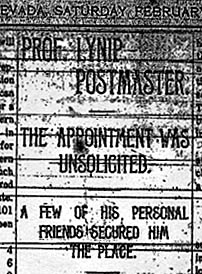 Lynip became postmaster, with the help of his friends. Lovelock Tribune - February 17, 1900 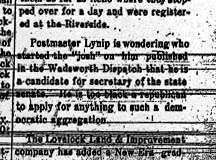 Lynip wonders who 'josh' him about being a candidate for secretary of the state senate. Lovelock Tribune - 1900  Northern Nevada Photo Linda Wada - September 2002 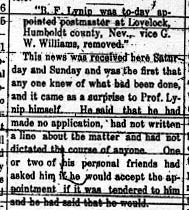 Lynip was surprised to be postmaster, but he was asked casually about the job by his good friends one day and if he would take it. His friends took his answer as yes, and got him the job. He never applied for it. His friends were some of the most important people in Lovelock Lovelock Tribune - February 17, 1900 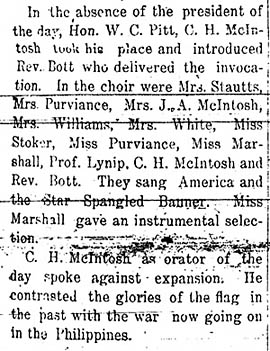 Lynip, Bessie and Louise sing the Star Spangled Banner at the 1899 4th of July celebrations. Lovelock Tribune - July 8, 1899 |
Lynips and Lovelock During his time in Lovelock, he became so well respected the city fathers appointed Lynip as postmaster for Lovelock, without even telling him. They did ask him, casually, if he would take the job if it were offered, and it seems the 'city fathers' liked his answer. But he was totally surprised when informed about the appointment, because he had not applied for it. This was unusual procedure for a state-appointed position. Nevertheless, state officials agreed with the decision, and Lynip humbly accepted. Lynip ran the post office job for about a year. But he did not re-apply for the job once his term was up. The Lovelock Tribune was very quick in stating that Mr. Lynip did not resign, and he was not fired by anyone. Lynip carefully explained he wanted to try new business options, which he did. He got involved in the sheep and wool business soon after leaving the post office and schoolmaster job.
Madison and Louise both knew Lynip through church, and Lynip knew Mrs. Bastian as well. (I’m currently researching to see if Bastian might have been a relative of Lynip, since Lynip was reported in one article during these years as having family in Lovelock.) Lynip knew the Purviances were trying to buy the hotel and needed money to do so. With no bank loan in sight, the most trusted man in Lovelock was there to help. |
The Contract Final Ownership Now who first approached whom may never be known, but what is known is the fact that Purviances and Benjamin F. Lynip did sign a contact dealing with The Singer Hotel on January 11, 1900. And Lynip had to trust the Purviances to the tune of $1650, a major sum for the time!
And on the same day, for the sum of $1.00, Lynip sold The Singer Hotel to the Purviances. But Lynip was not going to loan anyone $1650 without a properly worded legal document. Lynip was well educated and knew how to create a contract. For the $1.00, Madison and Louise got a very detailed seven-page contract to sign. But one item appears above the rest, final ownership of the Singer Hotel property. In that seven-page contract, it spells out very clearly what was expected of the Purviances, but simply put, the Purviances had two years to paid off the loan with interest. If they failed to fulfill their end of the contract, the ownership of The Singer Hotel was to be quietly handed over to Benjamin F. Lynip on January 11, 1902. The Purviances were to pay the sum of $30 per month, with interest, with the full balance due on January 11, 1902. Once paid in full by the Purviances, the deed would be handed over. The important clause in this contract was that Louise Wright Purviance would gain sole ownership of The Singer Hotel property. Was this usual? Maybe not. In fact, I found in my research of deeds in Humboldt County that this was quite common. In fact, the Tribune once reported that more women owned property in Lovelock than men. And some of the wealthiest people in town were women. Lovelock attracted many families. Even with several saloons in town, it was a quiet town compared to other towns that dotted the west. It had a stable family atmosphere with an equally strong religious base, which attracted families to the area. But work was strenuous and illness was hard to avoid. In general, men did not live as long as women. Illness, accidents, and even a few gunshot wounds, by accident or suicide, could mean an early end. H.T. Long’s death was just one example of a quick illness leaving wife and two young children. Madison was 52, and Louise was *36 years old when this contract was signed. Madison already suffered at least two serious injuries during their marriage. (Currently researching Louise's exact date of birth.) |
Louise may have had some say to get this clause added to the contract. She knew how hard living could be for a mother with children without the security of a home and a way to make a living for her family. And she knew first hand how quickly an illness could devastate a family’s life. Losing her first home had to play a part too! And one other thing, Louise knew Madison Purviance. Madison Purviance apparently had a growing drinking and gambling problem. The drinking problem started after the marriage. These facts alone could have played a major role in this clause being added. Whatever the case, the contract was signed by Madison, Louise and Benjamin Lynip on January 11, 1900. The Purviances had two years to pay off the loan. If paid by the due date, Louise would become the sole owner of The Singer Hotel. One has to think that Madison had to trust Lynip, to sign such a contract, and Lynip had to trust the Purviances too. Madison felt he knew exactly what he was doing. and for him everything appeared to be going well, at least on paper.  As the afternoon sun hung low in the January sky on the buggy ride home from the cemetery after the Long's funeral, many thoughts had to be running through the minds of Benjamin Lynip, Madison Purviance and Louise Purviance. Among those thoughts of Madison's could have been his plans for The Singer Hotel. Continue - Part 5 - The Workingmen Years |
Back to Top
All other content Copyright 2003-2016 - Edna Purviance, ednapurviance.org Research Collection
including photos and newspaper articles from public and private collections.
Linda Wada, WadaWorks, All Rights Reserved
Special thanks to the official county offices and libraries from Humboldt, Perishing and Butte County.
Letter from Edna to Chaplin - David Robinson's book Chaplin: His Life and Art
